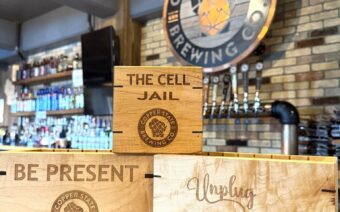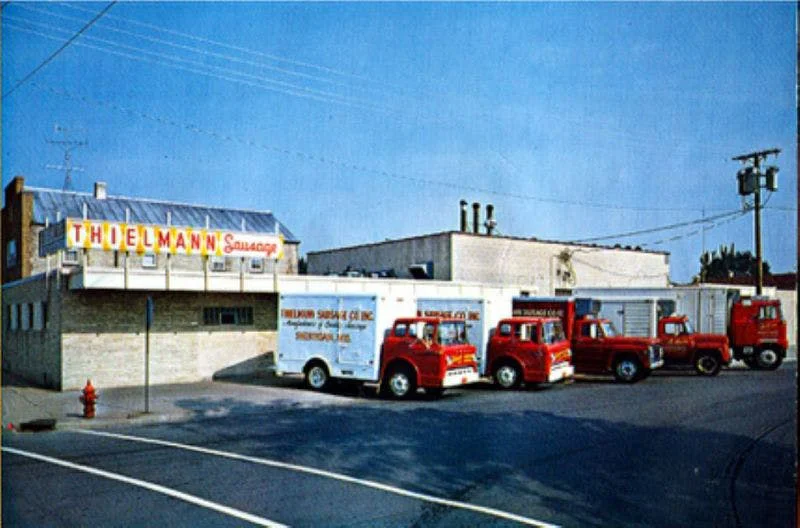
September 9, 2022
SHEBOYGAN – Over the course of the past 75 years, Old Wisconsin Sausage Company has more than quadrupled in size.
“We’ve transitioned from regional distribution to a nationwide market, all while maintaining a small company atmosphere and positive culture,” Vice President and General Manager Steve Harrison said.
Though the name has changed over time – getting its start as Thielman’s – Vice President and Head of Plant Operations Chuck Pfrang said one thing has remained constant, the company’s focus on people.
Pfrang said the culture of Old Wisconsin is what sets it apart.
“There’s 25- to 45-year veterans still running around here, and you get that when you have a healthy culture and when it’s a great place to work,” he said. “People want to keep coming back.”
A humble beginning
The now staple in the sausage industry got its start in 1947 as a family butcher shop that sold meat to local restaurants and grocery stores by partners Frank Thielmann and William Stolzman.
Crediting an increase in demand, Harrison said the company opened its first plant in 1953 and changed its name to Thielmann’s Old Wisconsin Sausage Company shortly after.
A difference of opinion eventually had Thielman and Stolzman parting ways.
“In 1976, Stolzman purchased the Rammer Sausage Company in Sheboygan, more than doubling the company’s sausage production at the time,” he said.
?
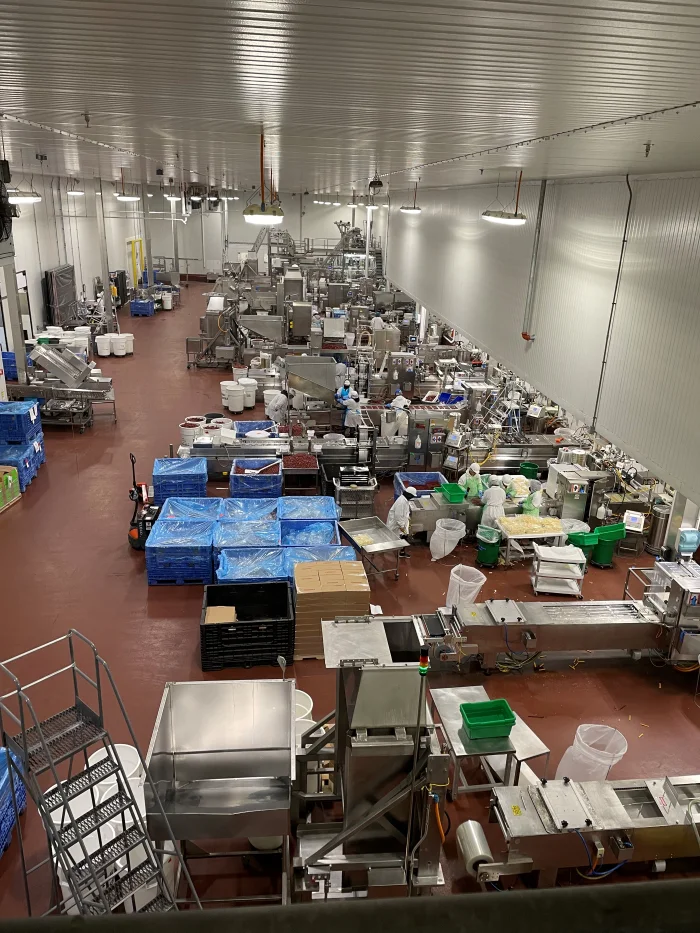
Old Wisconsin Sausage Company employees prepare and package snack sausages inside the climate-controlled factory in Sheboygan. Kat Halfman Photo
In 1981, Carl Buddig and Co., a family-owned meat-process company headquartered in Illinois, purchased the company and changed the name to Old Wisconsin Sausage Company.
Harrison said at the same time, the Buddig family acquired the Fat Freddie brand, which began a new era for Old Wisconsin.
“The acquisition of Fat Freddie gave us an opportunity,” he said. “They had (snack sausages) as a proprietary product, and we’ve expanded that – it grew on its own. People enjoy the product because it’s good.”
Harrison said the company found snack sausage to be more affordable to produce than traditional ethnic sausage and easier to ship, thanks to needing less refrigeration.
“By 1996, production had doubled yet again,” he said.
Today, Old Wisconsin has a retail shop at 2107 S. Seventeenth St. and a distribution and packaging facility at 4036 Weeden Creek Rd., which the company moved into from its former site on Union Avenue in 2016.
Strong product, dedicated staff
Harrison said Old Wisconsin’s success can be attributed to its four-legged approach.
“It starts with having good products – Old Wisconsin has had traditional, long-term recipes that have been well accepted in the community and in the industry,” he said. “The next component is making sure you have a good ownership team that can support growth through reinvestments. I would argue the Buddig family has done a nice job with that.”
Harrison said Old Wisconsin also has “phenomenal employees.”
“We’ve been blessed with having staff who have been committed, hardworking, dedicated to making good product and take pride in what they’re doing,” he said. “The final component of that four-legged stool is having loyal customers – people who appreciate the quality products.”
Weathering the pandemic
Harrison said the COVID-19 pandemic presented a unique challenge, particularly for the food industry, and Old Wisconsin was not immune to it.
“We had to get up in front of staff and tell them why it was important for them to continue to work because we make food,” he said. “Clearly, if we weren’t going to work and no other food plants would work, there would be an awful lot of people who wouldn’t have anything to eat.”
?
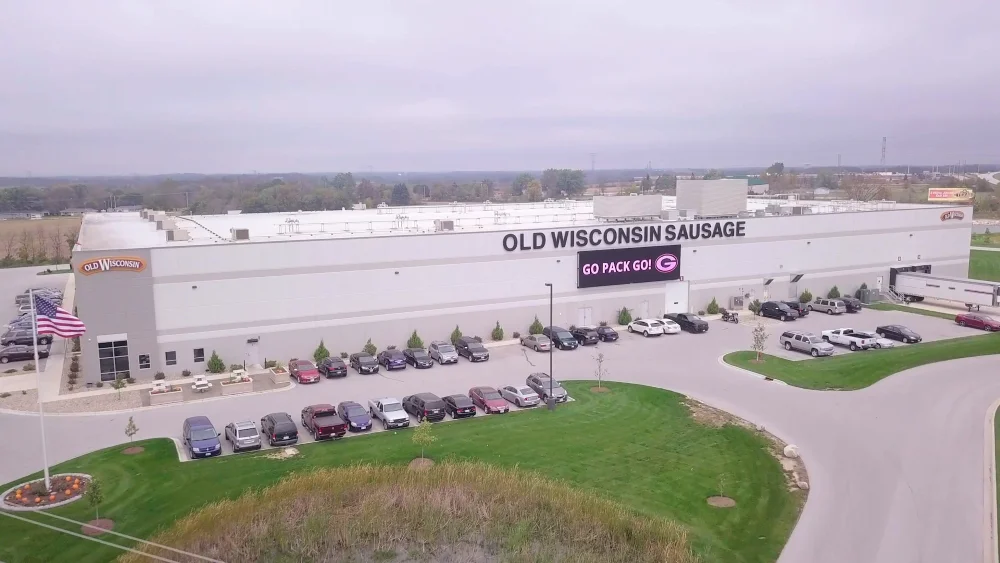
Old Wisconsin Sausage Company in Sheboygan is celebrating its 75th year in business. Submitted Photo
Old Wisconsin’s management team meets with staff annually, and Harrison said those meetings were imperative to keeping staff informed and supported.
“Our staff worked all through COVID, so we had a very low absentee rate,” he said. “We had COVID infections, but fortunately, we didn’t have any major issues associated with that. We promised them we were going to do our best to protect them and to keep them safe and healthy.”
Harrison said if the company didn’t have the trust of its staff, that would have been a hollow promise.
“We made a lot of changes to the plant,” he said. “We did a lot of deep cleaning, we had a masking and sanitation protocol – a lot of components to make sure we were using best practice to keep people healthy. “COVID was the most complicated time of managing a business in the 43 years I’ve been working in the business.”
Harrison said COVID created challenges far from home, too – in the form of supply chain issues with spices and packaging supplies.
“Customers and staff alike were impacted, but despite all the hardship, Old Wisconsin’s production and sales continued to grow,” he said. “The secret is trust. That is something that’s built over a period of time – that employees understand they’re a piece of something bigger – the company appreciates the things that they do.”
A continuous celebration
In a nod to the company’s year-after-year success, Harrison said celebrations and different social events are planned throughout the year.
“We have drawings for prizes when people work on weekends, and we have a company picnic where all staff and their families are invited in the summertime,” he said. “In wintertime, we have a party. Those things are designed to show a more human side of the business. Instead of being a peg, it’s a piece of the puzzle. We understand the responsibility we have of keeping a successful company.”
?//s3.amazonaws.com/appforest_uf/f1662749482565x814244624537470300/richtext_content.webp
Steve Harrison
Harrison said thanks to the company’s culture and the growing popularity of snack sausages, Old Wisconsin has practically doubled in size again over the past five years.
He said Old Wisconsin has continued to evolve as the company has grown in order to maintain its small-company atmosphere.
“When I first started, we’d have a picnic and everybody would know each other,” he said. “It was a close-knit group of folks. I think we’ve done a good job of maintaining that family atmosphere, but now we have the cousins, aunts and uncles, too – it’s like an extended family, but we’re still close and have common goals. We can have fun together and work hard in the process.”
 Lacing up a legacy: Premium boot company stays true to American workers, history
Lacing up a legacy: Premium boot company stays true to American workers, history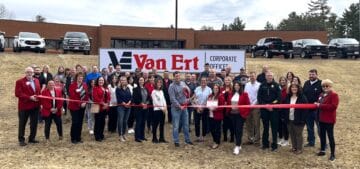 Van Ert Electric moves into new corporate office
Van Ert Electric moves into new corporate office



